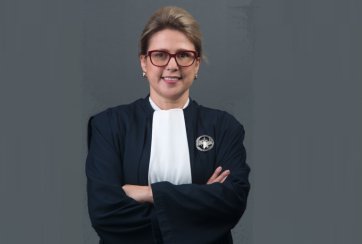Contact center of the Ukrainian Judiciary 044 207-35-46

On 24 May 2021, judge of the Commercial Cassation Court of the Supreme Court Olena Kibenko participated in an expert discussion on "Improvement of writ and summary court proceedings under the Civil and Commercial Procedural Codes: is it possible to simplify what has already been simplified?" The event was also attended by national and international experts of the EU Project “Pravo-Justice”, representatives of the Ministry of Justice of Ukraine, the Verkhovna Rada of Ukraine, Regional Justice Reform Councils and banking sphere.
Olena Kibenko pointed out that in 2020 the commercial courts received a total of 87 820 claims, including 41 243 ones with property requirements no more than 500 subsistence minimums, 11 304 – no more than 100 subsistence minimums. Thus, cases that can be considered in summary comprise almost half of all cases.
Pandemic posed new challenges to the courts. More and more countries revise their approaches to the court procedures. All actions are massively converted online, that means the pandemic accelerated digitalization.
“Digitalization should not be just copying, that is digitizing current court processes. Digitalization provides completely new opportunities, it will thus be necessary to reconsider the processes as such", said Olena Kibenko. No hearing (even by way of video-conferencing) in favor of the full-fledged online courts (based on available written materials 24/7) could be one of examples of such reconsideration. Online court allows participant of the process to perform absolutely all procedural actions and communications with his/her gadget (computer, smartphone) without leaving office or the house.
Ukraine should also reconsider procedural codes’ approach as to the need to hold the court hearings as such. It is particularly advisable to abandon them, where it is possible, e. g., in the court of cassation. The court should have more discretion in resolving these issues.
It is desirable to abandon the immediate decision-making after the hearing, if it is convened. Deciding and announcing of decision without motives is a Soviet relic and must be removed. As far as judges and parties to proceedings used to communicate with a court in a court-hearing regime, much efforts may be needed to move onwards true online litigation, and especially to equip the codes with the proper safeguards and warrants in order to avoid misuse.
The institute of order procedure is a relatively new one in commercial litigation. In other countries, it is mostly used to recover from individuals small debts for housing and communal services, bank loans, debts for the use of the Internet or telephone. As far as, no court order has been applied in commercial process before, the existence of the new option needs further clarification for entrepreneurs, active promotion of such a simplified form of collection of undisputed debts.
Answering about the role of the court staff, and of judicial assistants particularly, in respect of enhancing efficiency of court proceedings, Olena Kibenko underlined that every state, as it had an increase in number of cases, had an experience of delegating particular judicial powers to assistants or court staff. According to Olena Kibenko, delegating activities should be based in accordance with the basic principle: a judge should not take up time on plain and daily tasks, but should save it for the main function – ensuring a quality decision. And judicial assistant or an employee of the court can do simple technical work. According to O. Kibenko, monitoring of procedural laws will make it possible to find a number of functions that assistants could perform independently.